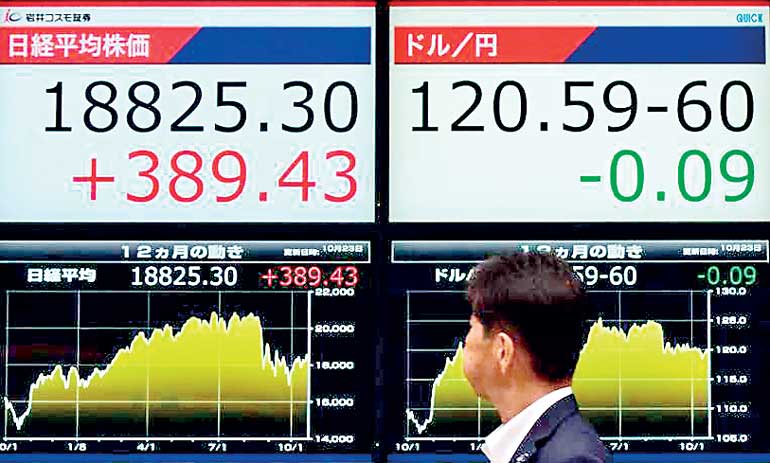Thursday Feb 26, 2026
Thursday Feb 26, 2026
Friday, 30 October 2015 00:00 - - {{hitsCtrl.values.hits}}

TOKYO/SINGAPORE (Reuters): Asian shares fell and the dollar stood tall on Thursday, after the US Federal Reserve revived market expectations that it may yet raise interest rates by year-end.
European markets are poised to open mixed, with financial spreadbetters expecting Britain’s FTSE 100 to lose about 0.1% on the open, and Germany’s DAX and France’s CAC40 to start the day up 0.5%.
While Wall Street ended a volatile session with solid gains, apparently underpinned by the Fed’s vote of confidence in the US economy, MSCI’s broadest index of Asia-Pacific shares outside Japan extended losses to 1.1% as of 0621 GMT.
The reaction in Asia was typical of recent tentative trading in global markets as the backdrop of slowing global growth made investors anxious over the Fed’s policy direction.
Indeed, S&P 500 e-mini futures edged down about 0.3%.
In overnight trade, U.S. Treasury yields and the dollar rose while Wall Street initially sold off and then reversed, after the Fed explicitly referred in its statement at the end of its two-day policy meeting, to conditions necessary “to raise the target range at its next meeting.”
Reference to a particular meeting is rare for the US central bank.
“There is no doubt an earlier move may give the markets greater clarity and more confidence,” said Chris Brankin, chief executive officer of TD Ameritrade Asia in Singapore. “However, focusing on the timing is feeding uncertainty.”
Another key signal was what the Fed did not say about global conditions. When it held policy steady last month, the Fed expressed concern that a slowing global economy could threaten the US outlook, so investors viewed the absence of these worries in the latest statement as opening the door to a rate hike this year.
“The biggest market risk has been the removal of the premium in the US dollar on the theory that the risk to the global and domestic economy is/was enough to stay until next year,” Evan Lucas, market strategist at IG in Melbourne, wrote in a note. “The market has been forced to reset its view on central bank differentials.”
The dollar declined 0.3% to 120.77 yen after spiking as high as 121.26 on Wednesday from a session low of 120.02.
The dollar index, which tracks the US currency against a basket of six of its major peers, fell about 0.3% to 97.519, but remained near the 2-1/2-month peak of 97.818 scaled after the Fed’s statement.
The euro reversed earlier losses, gaining about 0.2% to $1.0938 after skidding to a 2-1/2 month low of $1.0826 overnight.
The European Central Bank last week signalled its readiness to inject more stimulus to boost prices and the People’s Bank of China followed with its sixth interest rate cut in less than a year and a reduction in the amount of cash banks must hold as reserves.
Investors are speculating that the Bank of Japan could also expand its easing steps to keep economic recovery on track, but unexpectedly strong industrial output data on Thursday reduced the chance of the BOJ acting at its meeting on Friday.
Japan’s Nikkei, which swung between gains and losses, ended the day up 0.2%.
The Reserve Bank of New Zealand kept interest rates steady on Thursday as expected but reiterated that some further easing seemed likely eventually.
The New Zealand dollar dropped about 0.5% to $0.6663.